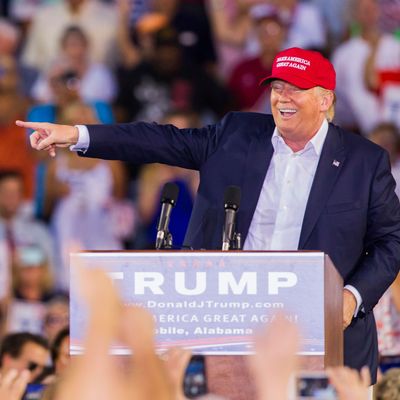
In January of this year, I had just taken my seat in the Alabama section (the only place I could obtain an insanely overpriced ticket) at the College Football National Championship Game in Atlanta when Donald J. Trump sauntered onto the field for the pre-game national anthem festivities. The crimson-clad fans around me stood and cheered lustily, even though most of them had just been standing in long lines in freezing rain thanks to the presidential security requirements created by Trump’s brief drop-in.
Alabama was and remains Trump country, at least among its predominant white conservative voters. He decisively won the relatively early 2016 GOP presidential primary in Alabama, securing 36 of 50 pledged delegates. In November, he won his fourth-largest percentage (63 percent) there, and given the state’s large African-American minority, it’s almost certain he won a higher percentage of white voters in Alabama than anywhere else. Yes, Trump’s endorsed candidate to succeed Jeff Sessions in the U.S. Senate during a 2017 special election, Luther Strange, lost the GOP primary, but the entire field offered up endless hymns of praise to POTUS. And the defeat of the GOP candidate in the general election had more to do with the peculiar traits — ideological and sexual — of Judge Roy Moore than with Trump’s standing in the state. At present, according to Morning Consult, his approval rating in Alabama is 63 percent, his highest (tied with West Virginia and Wyoming) in any state, and actually a point higher than it was when he took office.
The real litmus test of loyalty to Trump among Alabama Republicans has been created by his noisy estrangement from Jeff Sessions, a crucial 2016 supporter and his controversial choice to become attorney general. As Politico reports, there’s been a big recent shift in sentiment that can be fairly described as an abandonment of Sessions at the behest of the president:
When President Donald Trump attacked Attorney General Jeff Sessions last year, Alabama Republicans jumped to his defense, beating back the presidential incursion and sending Trump a clear signal: back off our guy.
Now, as Trump reprises his public assault on the man he blames for his mounting legal woes, Sessions is getting the silent treatment from his hometown allies.
Keep in mind that Sessions was elected to the Senate in Alabama four times, avoiding any significant primary opposition after his initial race in 1996, and running unopposed in both the primary and the reelection in 2014, his last race. And remember also that Sessions isn’t in Trump’s doghouse for any sin against conservative ideology that Alabama Republicans might cite to brand him as an apostate: it’s all about the Russia investigation recusal, and Trump’s war on the investigators. But on Sessions’s home turf, his defenders are few and far between:
Amid this latest confrontation, not one member of the House delegation from Alabama has tweeted a word of support for Sessions except Rep. Gary Palmer, who responded only to what he claimed was negative media attention and publicly defended the attorney general. POLITICO reached out to all six GOP House members from the state and only Palmer responded before publication.
It’s Trump’s party now, even if that means betraying old friends:
The change in tone stems, some Alabama GOP insiders say, from Trump’s increasing stranglehold on Republican voters. Trump has emerged as the undisputed compass of the Republican Party base, single-handedly deciding fortunes in many Southern primaries. Whereas Sessions was once a fixture in Alabama GOP candidates’ ads — his endorsement a coveted sign that the conservative base could get on board — a Trump endorsement is now the ultimate boost.
“If I’m looking at it from the political side of it, I’m going to be with Trump,” said David Mowery, a veteran Alabama political consultant. “I don’t know what being Sessions’ bulwark gets you. But I do know what making Trump mad gets you.”
Unfortunately for Alabamians, their respect for Trump is not reciprocal, according to a new report from Politico:
If Sessions’ recusal was his original sin, Trump has come to resent him for other reasons, griping to aides and lawmakers that the attorney general doesn’t have the Ivy League pedigree the president prefers, that he can’t stand his Southern accent and that Sessions isn’t a capable defender of the president on television — in part because he “talks like he has marbles in his mouth,” the president has told aides.
As Jonathan Chait notes, anyone who has observed Trump over the years shouldn’t be surprised that he has a parochial prejudice against southerners who are not of his economic class, and most definitely looks down on those who were educated at plebeian institutions like the University of Alabama, where Sessions got his law degree. You do have to wonder what he thought about those Alabama football fans who cheered him in Atlanta in January
Clearly Trump is benefitting in places like Alabama from a conservative GOP ascendancy built on racial resentments, pro-business boosterism, and Christian right activism long before the mogul ran for office–built by pols, as it happens, much like Jeff Sessions. But it remains a great irony of contemporary politics that a coastal elitist like Trump commands a vast right-wing-populist army that is willing to frag its past leaders at the drop of a tweet.






























